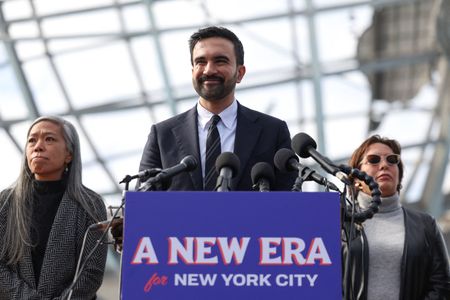By Jacob Gronholt-Pedersen, Maggie Fick and Bhanvi Satija
COPENHAGEN (Reuters) -Wegovy-maker Novo Nordisk trimmed its full-year forecasts on Wednesday as sales growth of its blockbuster obesity drugs slows, leaving investors worried the firm is losing ground to U.S. peer Eli Lilly and copycat rivals.
Novo’s shares whipsawed through the day, sliding and then rising on a better-than-expected Medicare pricing deal in the U.S., before eventually falling back as its new CEO struggled to win investors over to his plans to claw back lost market share.
“Lilly is winning quite meaningfully at the moment,” Jefferies analyst Michael Leuchten told Reuters, adding that management’s message had not been strong enough after a weak quarter with sales and profits just below forecast.
“It’s obviously, blatantly clear in that top-line miss.”
NOVO NORDISK FACING ‘A LOT OF HEADWINDS’
CEO Mike Doustdar, who took over in August, is driving a turnaround plan to fight back against Eli Lilly, which posted far stronger results last week and raised its 2025 guidance.
Surging demand for Wegovy – the first in a new class of GLP-1 weight-loss drugs – propelled Novo to become Europe’s most valuable firm, worth as much as $650 billion in June 2024.
But sales growth has slowed sharply amid competition from Lilly’s Zepbound and compounded copycat drugs made from the same ingredients, prompting Novo’s shares to plunge about 70%, a change of CEO, and a board shake-up. Novo is also in a takeover battle with U.S. rival Pfizer for biotech Metsera.
Doustdar said the Danish company was expanding its direct-to-consumer sales in the U.S. and was confident it would win the bidding with Pfizer for Metsera. Novo has bid $10 billion for the firm to help bolster its obesity drug pipeline.
“Overall, I didn’t find management’s tone to be overly optimistic,” said Markus Manns, portfolio manager at Novo shareholder Union Investment, citing challenges over pricing, tighter U.S. insurance budgets, and patent expiries.
“If you add it up, that’s a lot of headwinds over the next two years.”
‘WHEN THERE’S A LION CHASING YOU’
Novo said unlawful mass compounding of GLP-1 drugs expanded in the third quarter, and there were now “well above” a million patients using the copycat versions in the United States, its U.S. chief Dave Moore said on a call with analysts.
The firm had said in May it expected Wegovy sales to begin to recover once a ban on compound copycats was enforced that month, but said on Wednesday this had still not happened.
HSBC analyst Rajesh Kumar said compounders were focusing on semaglutide, the active compound in Wegovy, which was impacting Novo more than Lilly’s Zepbound.
“When there’s a lion chasing you and me, I just need to outrun you. If Zepbound and Wegovy both are being targeted with compounded drugs, you just let compounders go after Wegovy, which is a better-known brand,” he said.
Novo has filed lawsuits against dozens of U.S. pharmacies and companies selling Wegovy copies, but sales have continued.
MEDICARE PRICING ‘BETTER THAN FEARED’
Novo’s guidance cut – the fourth this year – was tempered by news the company had agreed a Medicare price for semaglutide under the U.S. Inflation Reduction Act, removing some uncertainty for investors. The price comes into effect in 2027.
However, both Novo and Lilly are also expected to announce separate deals with the Trump administration to cut prices of their weight-loss drugs, a White House source said on Tuesday, which could give Novo expanded Medicare coverage sooner.
Novo did not disclose the price agreed under the IRA but said that if applied this year, it would have had a “low-single-digit negative impact on sales”.
JP Morgan analysts estimated that this implies an annual sales hit of about 6 billion Danish crowns ($937 million), calling it “better than feared”.
THE RISE AND FALL OF NOVO NORDISK
Novo now expects full-year operating profit – measured in local currencies – to grow between 4% and 7%, down from 4%-10% previously. It trimmed its full-year sales growth to between 8% and 11%, down from 8%-14%.
It expects sales growth to slow further in the fourth quarter, after growing at the slowest pace since early 2022 in the third quarter at 11%, below analysts’ estimate of 11.4%.
Mikael Bak, head of the Danish Shareholders’ Association, which has 17,000 members – a majority of them invested in Novo – said the update was not a surprise, but “nevertheless a disappointment”.
“We support the transformation process now underway and view this as a moment for patience, focus, and disciplined execution,” he added.
($1 = 6.4029 Danish crowns)
(Reporting by Jacob Gronholt-Pedersen and Maggie Fick; Editing by Adam Jourdan, Emelia Sithole-Matarise and Mark Potter)









